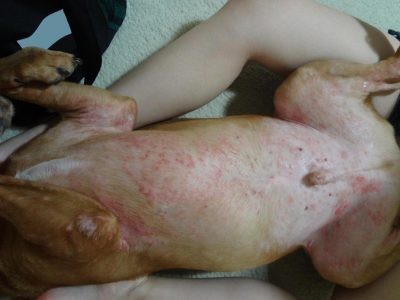Discovering your pet scratching incessantly can be distressing. If you’ve recently enjoyed outdoor adventures together, especially in wooded areas or fields, chiggers might be the culprit. These tiny pests are a common source of discomfort for our beloved dogs and cats. Pet owners often wonder, “Can Pets Carry Chiggers?” and it’s essential to understand the relationship between pets and these irritating mites to effectively protect your furry companions.
 Chiggers on dog belly
Chiggers on dog belly
What Exactly Are Chiggers?
Chiggers, also known as harvest mites or berry bugs, are minuscule members of the arachnid family, related to spiders and ticks. They are incredibly small, often less than 1/100th of an inch in size, and have a distinctive orange or reddish hue. These pests thrive in grassy and wooded environments and are most active during warmer months, typically from late summer through fall. It’s important to note that only the larval stage of chiggers is parasitic.
Contrary to popular myths, chiggers do not burrow under the skin. Instead, these larvae are surface feeders. When they come into contact with a host, they attach themselves to the skin and use their mouthparts to pierce the skin’s surface. They then inject saliva containing enzymes that break down skin cells. The chigger larvae feed on these liquefied cells, and it’s this enzymatic saliva that causes the intense itching and skin irritation associated with chigger bites.
Can Pets Get Chiggers?
Yes, pets, especially dogs and cats, are susceptible to chiggers. When pets walk through infested vegetation, chigger larvae can easily climb onto them. On dogs, chiggers are frequently found on areas with thinner fur, such as the belly, groin, around the ankles, and ears. Cats, being meticulous groomers, can get chiggers anywhere on their body, but common spots include around the ears, face, and between their toes.
It’s crucial to understand that pets don’t “carry” chiggers in the sense of harboring a chigger infestation within their fur long-term or spreading chiggers from pet to pet indoors. Instead, pets pick up chiggers from infested outdoor environments like grassy fields, forests, and overgrown vegetation. They are essentially temporary hosts that encounter chiggers in their natural habitat. The chiggers will feed and detach within a few days.
Recognizing Chigger Infestation in Pets: Symptoms to Watch For
The most telling sign of chiggers on pets is sudden, intense itching, often starting a few hours after being outdoors in chigger-prone areas. Your pet may excessively scratch, bite, lick, or rub against surfaces to relieve the itch. This intense scratching can lead to several visible skin issues:
- Red bumps or papules: Small, raised red bumps may appear on the skin, often in clusters.
- Hives or wheals: In some cases, raised, itchy welts similar to hives may develop.
- Crusting and lesions: Persistent scratching can break the skin, leading to crusting, scabs, and open lesions.
- Hair loss: In areas of intense irritation and scratching, hair loss can occur.
- Orange specks: In heavy infestations, you might even notice tiny orange specks on your pet’s skin – these are the chigger larvae themselves.
Cats may exhibit similar symptoms, including excessive grooming, scratching, and potential skin lesions, particularly around the head and paws.
Diagnosis and Effective Treatment for Chiggers on Pets
If you suspect your pet has chiggers, a veterinary examination is recommended for accurate diagnosis and treatment. Veterinarians can diagnose chiggers through:
- Visual Examination: In many cases, chiggers can be identified by their characteristic orange appearance, especially if present in large numbers.
- Skin Scraping: If fewer mites are suspected, a veterinarian may perform a superficial skin scraping and examine it microscopically to confirm the presence of chiggers.
Treatment typically involves:
- Bathing: A thorough bath with pet-safe shampoo can help remove chiggers from the skin surface.
- Topical Medications: Veterinarians may prescribe topical medications like insecticidal shampoos, sprays, or spot-on treatments to kill any remaining chiggers and prevent secondary skin infections.
- Anti-inflammatory Medications: To alleviate itching and inflammation, veterinarians may prescribe corticosteroids or antihistamines.
- Antibiotics: If secondary bacterial skin infections have developed due to scratching, antibiotics may be necessary.
It’s crucial to consult with your veterinarian for appropriate treatment as some over-the-counter products may not be safe or effective for chiggers on pets.
Can Pets Spread Chiggers to Humans?
A common concern is whether pets can transmit chiggers to humans. The good news is that pets cannot directly spread chiggers to people. Chiggers are acquired from the environment, not from host to host. Humans and pets pick up chiggers from the same outdoor sources – infested vegetation.
If you find chiggers on your pet, it indicates that both you and your pet may have been exposed to chiggers in the same environment. If you are experiencing itchy bites after being in the same areas as your pet, you may also have chigger bites. Human reactions to chigger bites typically involve intense itching and a rash.
Protecting Your Pet from Chiggers
Prevention is always better than treatment. To protect your pet from chiggers:
- Limit Exposure: Avoid walking your pet through heavily wooded areas, tall grasses, and overgrown vegetation, especially during peak chigger season.
- Maintain Your Yard: Keep your lawn mowed and remove weeds and brush to reduce chigger habitats around your home.
- Pet-Safe Insect Repellents: Talk to your veterinarian about using pet-safe insect repellents that contain ingredients effective against mites.
- Bathing and Grooming: Regular bathing and grooming, especially after outdoor excursions, can help remove chiggers before they cause significant irritation.
- Check Your Pet: After walks in potential chigger habitats, check your pet for any signs of irritation or tiny orange specks, particularly in vulnerable areas.
By understanding “can pets carry chiggers,” and taking preventive measures, you can significantly reduce the risk of chigger infestations and keep your furry friends comfortable and itch-free. If you suspect your pet has chiggers, always seek veterinary advice for prompt diagnosis and effective treatment.
